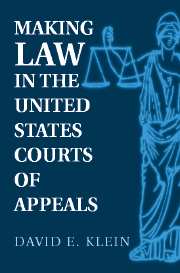Book contents
- Frontmatter
- Contents
- List of Tables
- Acknowledgments
- 1 Law Making in a Hierarchical Judicial System
- 2 Theory and Hypotheses
- 3 The Cases
- 4 Influences on Circuit Judges' Responses: Case Evidence
- 5 Influences on Circuit Judges' Responses: Interview Evidence
- 6 Anticipating the Supreme Court
- 7 Implications and Future Directions
- Appendixes
- A Rules and Cases
- B Interview Questions
- References
- Index
B - Interview Questions
Published online by Cambridge University Press: 10 December 2009
- Frontmatter
- Contents
- List of Tables
- Acknowledgments
- 1 Law Making in a Hierarchical Judicial System
- 2 Theory and Hypotheses
- 3 The Cases
- 4 Influences on Circuit Judges' Responses: Case Evidence
- 5 Influences on Circuit Judges' Responses: Interview Evidence
- 6 Anticipating the Supreme Court
- 7 Implications and Future Directions
- Appendixes
- A Rules and Cases
- B Interview Questions
- References
- Index
Summary
This is a copy of the notes I used to conduct the interviews. Most interviews departed from the order and wording given here in some way, but it gives a generally accurate picture of how the interviews were conducted, following introductions.
I'm interested in whether judges tend to specialize, develop expertise in particular areas: Are there any particular fields of law in which you consider yourself expert [prompt: any in which you specialize?]
Does this circuit have special expertise in any areas?
I'm particularly interested in three areas of law: antitrust; search and seizure; and environmental law.
Thinking back over the last 10 or 15 yrs., are there any circuits (or individual judges?) with particular expertise in antitrust (in your own opinion or by general reputation)?
Would it be possible to rank the circuits in some way?
What about search and seizure? Environmental law?
It seems that circuits sometimes gain reputations for general excellence. [If needs cue: An example would be the 2nd Circuit in the 1940s and 50s.] Are there any circuits today which have a reputation for general excellence or which in your view merit such a reputation?
Is it possible to rank the circuits on this dimension (perhaps high, medium, and low)?
Returning for a moment to the three areas of law I mentioned – antitrust, search and seizure, and environmental law – would you say that any of these areas are generally more or less difficult than the others?
- Type
- Chapter
- Information
- Making Law in the United States Courts of Appeals , pp. 168 - 170Publisher: Cambridge University PressPrint publication year: 2002



